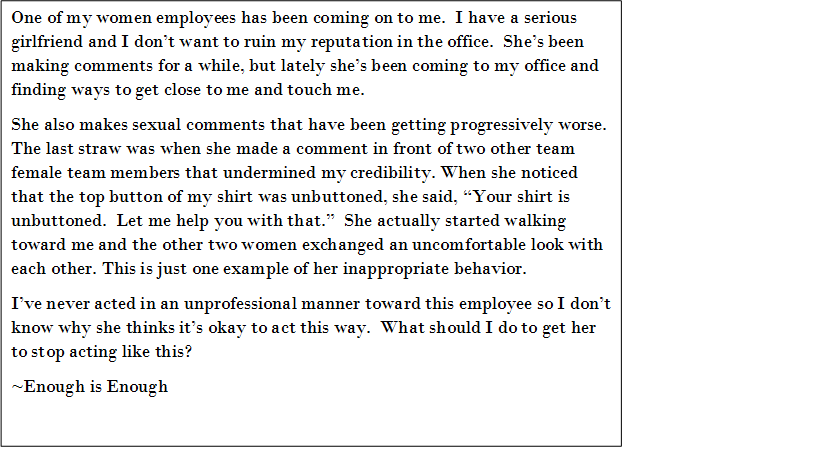Will Your Employees Follow You Off a Cliff?
There’s a difference between having loyal employees who believe in you and the company vision and having people who follow because they don’t want to make waves or get into trouble. It’s important for employees to believe in the organization’s mission and goals and to want to help reach those goals. But following blindly can lead to big problems.
You may be thinking that it’s great that everyone agrees with what you’re saying. However, it could mean that they don’t care enough or are afraid to speak up. Typically, strong emotions are linked with strongly believing in something. It’s much easier for someone who doesn’t care to sit back and watch the organization go down the wrong path than to speak up and risk disapproval or discipline.
A company that I worked with had a CEO who did not like to hear about the reasons that people were leaving. This company was experiencing extremely high turnover, which was costing thousands of dollars every month, yet he didn’t want to know the feedback that employees gave in the exit surveys.
As difficult as it may be for you to listen to information that goes against what you believe, it’s important that you do it. If not for yourself, do it for your company.
You may feel as if you’re opening yourself up to listen to complaints and arguments on a daily basis, but you can set up the situation so this is not the case. Encourage people to offer solutions when they come to you to express their concerns. Set aside a time each week when people can come and discuss these issues with you. Ask them, “What is the problem?” “How is it affecting the business or how will it affect the business in the future?” “What are potential solutions?” In addition to encouraging people to talk to you about concerns, also provide an anonymous way for people to share information.
During team meetings, ask someone to act as a devil’s advocate and ask the tough questions. Employees are going to observe how you react when they do give you information or ideas that challenge the status quo. How you handle this information is going to play a big role in whether or not they choose to continue to give you this type of information. Thank the person when they give you the information. If it makes you angry or emotional, take yourself out of the situation and then revisit it after you have calmed down.
It’s much better to be a leader that can listen to what employees are saying and use it to lead people to great heights than to tune out everyone’s opinions and lead people off a cliff.
Don’t Just Manage; Inspire!
Are you managing or inspiring? Hopefully, you’re doing both, but if not, it’s not too late to start. Wouldn’t it be much better if your employees were doing their work because they wanted to, not because they felt as if they would be fired if they didn’t do it?
The definition of “inspire” according to Merriam-Webster dictions is “to make (someone) want to do something, to give (someone) an idea about what to do or create; to influence, move, or guide.”
As a manager, think about how many of your employees you’re inspiring on a daily basis. I’m not talking about fake inspiration such as posting nice quotes on your wall and doing a motivational cheer in the morning. These things can help, but not on their own. In order to be an inspiring force to others, you need to feel inspired in your role. Of course you still need to carry out your daily management responsibilities, but you’ll find that these responsibilities become easier when your employees are inspired.
If you’re feeling burnt out or overwhelmed, it’s going to be difficult for you to inspire others, because your energy is consumed by just getting through the day. Take a vacation day if you need it. If you’re stuck in a rut yourself, revisit what you enjoy about your job. It may be time to set new goals for yourself. Think of learning and development opportunities for yourself and discuss them with your manager.
Inspiration requires exuding energy and interest. People may say, “Well what if I’m an introvert and don’t want to seem fake.” It has nothing to do with being an introvert or extrovert. Trying to change your personality in order to appear inspirational will actually have the opposite effect.
After you’ve found or re-gained inspiration for your job, it’s now time to show that inspiration to your employees!
Talk to your employees about how their work is impacting the company’s goals. Discuss where the company is headed and how your team is helping the company move in the right direction. Have career discussions with each of your employees. Learn what their strengths and development areas are and what they enjoy about their jobs. Use this information when assigning new projects.
Assess your body language and tone when you speaking to your employees. Do you sound confident? Is your tone upbeat? Are you truly interested in what you’re saying?
Two people could both be doing the work, but the one who is inspired stands out. Other people notice. The energy of inspiration rubs off on them. You find that work becomes easier and time just flows. Employees become more engaged. Being inspiring may take some work at first, but the pay-off is well worth it. Just ask any inspiring manager.
What do you do to inspire others? What do you do to inspire yourself?
What should I do if I’m being harassed at work?
I received this question from a male manager who didn’t know who else to turn to for advice. In all my years in HR, I’ve rarely had a sexual harassment report from a man, so it made me wonder if men are suffering in silence. That said, many women also don’t take action after being harassed at work. Regardless of your gender, you should take action. This manager said that I could share his problem here.
Thank you for bringing up this question. I understand why you didn’t take action in the beginning, but it seems as if you ignoring the problem indicated to her that her behavior was okay. Now you know that you can’t just hope the issue will go away. You must deal with it directly.
You can go speak to HR anytime, but since you haven’t talked to the employee about it yet, I would recommend that you have a conversation with her as a first step. Prepare a list of specific incidences to discuss with her (the more recent the better).
If you try to play it off as a joke, she may think that you’re amused by her antics. Tell her that her comments and actions make you and others feel uncomfortable and that they also make her appear less professional to you and others. During the meeting, be firm but kind with her. Since you haven’t said anything to her until now, she may feel surprised and embarrassed. Let her know that you value her as an employee (if it’s true), but that if this behavior continues, you’ll have to report it to Human Resources. Document the conversation in writing.
If she continues to display inappropriate behavior or make sexual comments, address the issue in the moment or shortly after by firmly saying something to the effect of, “That is not appropriate. Please do not make that type of comment.”
Then stick to your word and report it to your manager and Human Resources. If you don’t do anything about it, one of your employees may be bothered by it or perceive her as getting better treatment because of her interactions with you. This could cause the employee to report it to Human Resources. It will cast you in a bad light, because you have allowed the behavior to continue.
I know it’s a tough situation, but you are doing the right thing by taking action. Good luck!


